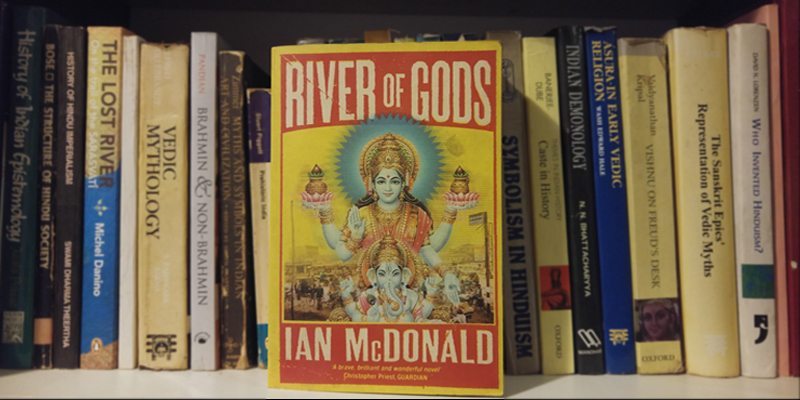
August 15, 2047. It’s the 100th birthday anniversary of independent India, but it’s not a very happy birthday. In a case of extreme federalism, India as we know it has been Balkanised into a dozen states, all at odds with each other with their own, separate strategic interests and aims. Climate change is taking its toll and there are water wars on the horizon with the river of gods, the Ganga, becoming the flashpoint after three years of drought. While the States of Bengal are towing ice from the Antarctic, their neighbour and erstwhile rival Bharat is enraged at neighbouring Awadh building a dam upriver and amassing its troops for war.
This in itself would be enough to fill up a novel, but in British author Ian McDonald’s River of Gods, this is just something that happens in the background, because there are far bigger things taking place in this world, and there are more important stories to be told than just inconvenient truths.

Bharat, with its capital at Varanasi, forms the microcosm of India in River of Gods. And the state it finds itself in (apart from the water scarcity and overpopulation) is by and large good. Ancient traditions co-exist with modern technology, most notably AI (‘aeais’ in the book) — the Bharati people are hooked on to the wildly popular ‘soapi’ (or soap opera) Town & Country, which has AI characters playing AI roles.
But there’s a catch. The Hamilton Laws prevent the sentience of aeais from going above Level 3 (and thus able to pass the Turing Test) or they risk being ‘excommunicated’ by Bladerunner-style police called ‘Krishna Cops’, one of whom, Mr. Nandha, is one of the main characters through whose eyes we see the story unfold. Mr. Nandha uses aeais to catch aeais; only, his aeais are really more powerful and go by the names of the gods: Saraswati, Ganesha, Kali and Indra. They help the Krishna Cop catch and kill rogue aeais.
But as one of the aeais, who is the number one soap actor in Bharat, tells Swedish-Afghan journalist Najia Askarzadah, “Any aeai smart enough to pass a Turing test is smart enough to know to fail it.” Readers of this book will see why these words are important, but their import is lost on the journalist, whose desire to be part of history being made throws her right in the middle of the civil war, by unwittingly becoming a pawn of a shady opposition leader, NK Jeevanji, a man whose sole aim is to bring down the government of Bharat.
“Any aeai (AI) smart enough to pass a Turing test is smart enough to know to fail it.”
The only person standing in his way is Shaheen Badoor Khan, key advisor and the brains behind the Sajida Rana government. And what threatens to bring him down is Tal, who is a “nute” — a genderless individual like many who, thanks to advanced medical technology, have given up their gender in return for other gifts. Yt (a nute’s preferred pronoun) is a set designer on Town & Country and gets into a relationship with Shaheen Badoor Khan, which threatens to destroy yt’s career and the government.
Elsewhere in Varanasi (in New Sarnath), Vishram Ray, a rich playboy and wannabe professional stand-up comedian, successful so far only in getting into the pants of his lawyer, is called back to Bharat to take over a power company following the sudden sanyas of his father, just as the company is about to harvest Zero-Point Energy by tapping into alternate universes. You guessed it! Vishram is yet another of our major characters. And we’re not done yet.
A novel of this scale, detail and inventiveness needs these many characters to take us though all the threads of the story and all its ideas – from artificial intelligence, biotechnology, medical science, quantum mechanics, automation, genetic engineering and sociological observations, while weaving in Indian philosophy, culture and political power play, with some musings on the difference between Western and Indian societies. And for all this, it clocks in at just about 600 pages (at least my 2005 Pocket Books paperback edition does) including a glossary of Indian terms and a soundtrack listing that includes Talvin Singh, Asian Dub Foundation, AR Rahman, Jeff Buckley, Nusrat Fateh Ali Khan, Bjork and Kabhi Khushi Kabhi Gham, to name a few.

Meanwhile, as Bharat is in turmoil, India is 208 for 5 in the second test match (innings unspecified).
Also in the ‘meanwhile’, an asteroid has been detected in Earth’s orbit that contains in its core a near-perfect sphere, which is way older than the known universe. Initially thought to be a black hole remnant, this is, in fact, an AI construct, which sends a message to one of the scientists investigating the asteroid a message that brings her to India in search of a man who can explain all this. The scientist, Lisa Durnau, comes looking for a Thomas Lull, a brilliant scientist and inventor who is currently hiding himself and his past in a South Indian village. Lull in turn meets the mysterious Ajmera Rao or Aj, a young girl in search of her biological parents, who Lull feels compelled to protect and thus ends up following on her journey, only to see her turn into a Neo-like person who can see the past, the future, peep into people’s lives and control machines and robots effortlessly.
By now you’d have figured out that all three are important to the story.
So is Shiv, a down-on-his-luck gangster neck-deep in loans (and afraid of robot debt-collectors who drop down from the sky), who ends up working for tech titans and doing their dirty work. Rounding off this cast of main characters is Parvathi, the wife of the aforementioned Krishna cop, Mr. Nandha.
There you go, introductions done, with no spoilers! You, dear reader, are all set to dip and dive into River of Gods.
People with sensitive sensibilities be warned: this books speaks some harsh truths, makes comments that some may find offensive and has explicit and unusual scenes of coitus.
Is it cyberpunk? Post-cyberpunk? A thriller? River of Gods defies easy categorization, except as a good science fiction novel. It doesn’t so much hurtle through the chapters as amble from one page to another, giving us glimpses of a futuristic India. It’s not a very easy read – jumping as it does from one plot point to another, weaving back and forth between characters and what’s happening with them – but one that is fulfilling once you reach the conclusion. Once you cross the 100-page mark, things get easy, until the last 100 pages where you want the story to move faster than it does. In keeping with the tradition of social fiction, there are info dumps every so often. But these info dumps only help with fleshing out the world that is Bharat and its chaotic milieu. People with sensitive sensibilities be warned, this books speaks some harsh truths, makes comments that some may find offensive and has explicit and unusual scenes of coitus.
McDonald is known for writing stories that portray the impact of rapid social and technological change on non-Western societies
Speaking as an Indian, I can say that Ian McDonald has done his research into India, its culture, its dark underbelly as also its philosophies (Part Two of the book is called Sat Chid Ekam Brahma, with Tandava Nritya being the name of Part Four). His future India is vivid.
McDonald is known for writing stories that portray the impact of rapid social and technological change on non-Western societies, and that reputation rests in a large part on 2004’s River of Dreams. His novels Brasyl and The Dervish House, set in Brazil and Turkey respectively (doing to these countries what River of Gods does for India) cemented this reputation. River of Gods was so successful that it wasn’t just nominated for all the big awards in the Best Novel category, it also led to a follow-up called Cyberabad Days, a collection of short stories in which McDonald revisits in more detail the world of River of Gods.
So go ahead, and embark on a journey rife with technology, futurism, spirituality, mystery, love, sex, tradition, culture, war and humanity in the India of 2047. Live Long and Prosper.
Subscribe to FactorDaily
Our daily brief keeps thousands of readers ahead of the curve. More signals, less noise.
To get more stories like this on email, click here and subscribe to our daily brief.
Disclosure: FactorDaily is owned by SourceCode Media, which counts Accel Partners, Blume Ventures and Vijay Shekhar Sharma among its investors. Accel Partners is an early investor in Flipkart. Vijay Shekhar Sharma is the founder of Paytm. None of FactorDaily’s investors have any influence on its reporting about India’s technology and startup ecosystem.








